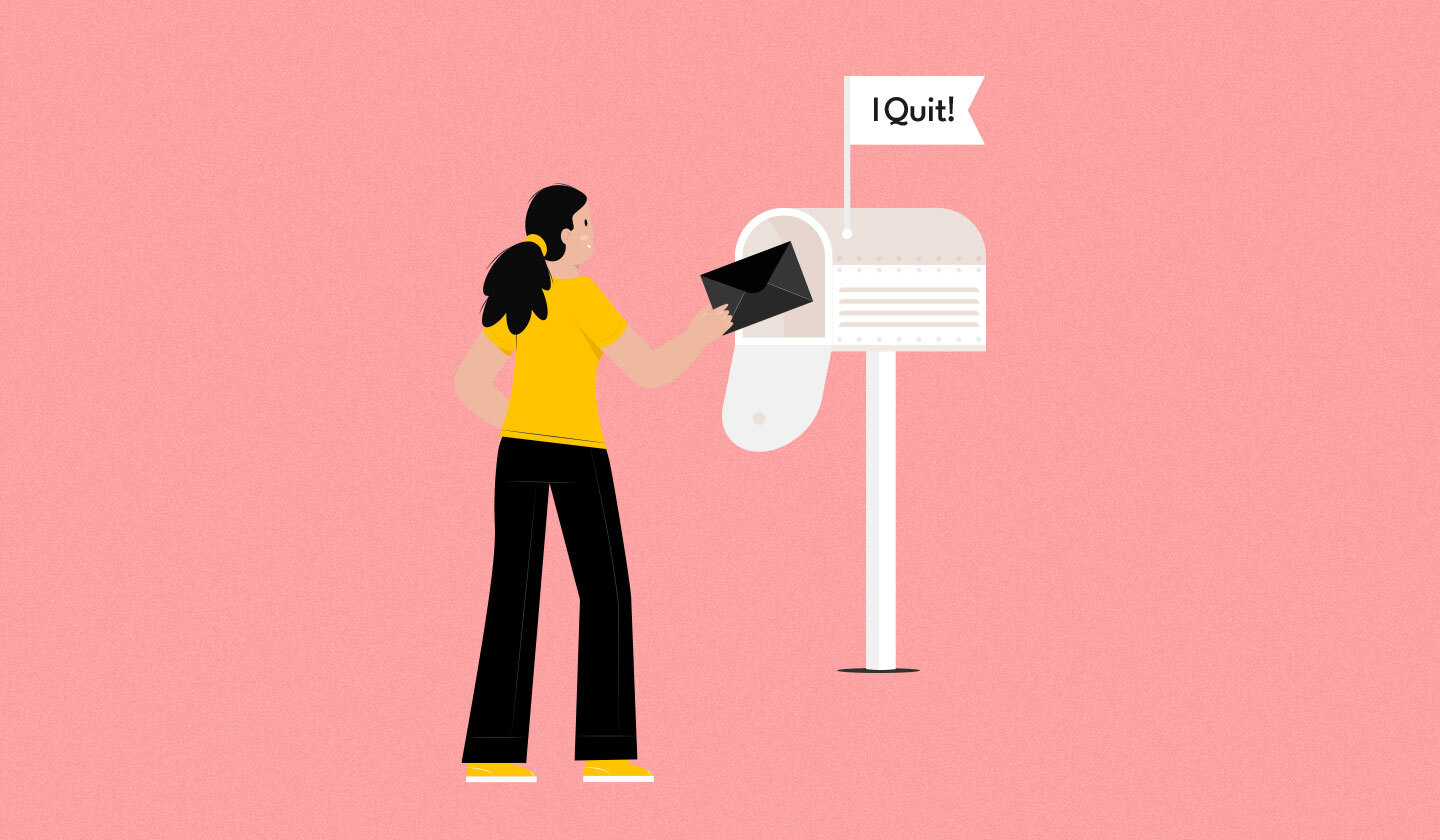Have you been thinking about leaving your current job? Don’t worry, you aren’t alone! We all want to quit now and then but take a second to think before jumping the gun. It’s a significant decision that requires careful consideration, and it’s crucial to weigh various factors carefully. Quitting a job can have far-reaching consequences, impacting your career trajectory, financial stability, and overall well-being. Therefore, it’s essential to consider these 10 important aspects before walking away:
Table of Contents
Reasons for leaving
Understanding why you want to leave your job is the crucial first step in making a well-informed decision. It’s essential to delve deeper into your feelings and motivations. Are you feeling undervalued, unfulfilled, or unhappy with your work environment? Perhaps you’ve outgrown your role or are seeking new challenges. You can evaluate whether those issues are resolvable or if it’s time to move on by pinpointing the reasons driving your desire to leave.
Feeling undervalued or unappreciated at work can take a toll on your motivation and job satisfaction. If you consistently feel overlooked or ignored despite your efforts, it may be a sign that your current job needs to be a better fit for you. Similarly, if you find yourself constantly bored or unchallenged by your tasks, it could indicate a lack of growth opportunities in your current role. Assessing your work environment is also crucial. Do you feel comfortable and supported by your colleagues and superiors, or is there a toxic or negative atmosphere that makes it difficult to thrive? Your work environment significantly affects your overall job satisfaction and well-being.
If you’ve achieved everything you set out to accomplish in your current role and there’s limited room for advancement, it may be time to explore new opportunities that better align with your aspirations. Understanding the root causes of your dissatisfaction with your job will help you make a more informed decision. It’s essential to weigh the pros and cons carefully and consider how your decision will impact your career and personal life in the long term.
Financial Stability
Before you say goodbye to your job, it’s crucial to take a good, hard look at your finances. This means really digging into the numbers: how much money you’re spending each month, any debts you might have hanging over your head, and how much money you’ve managed to squirrel away in savings. It’s like taking a snapshot of your financial health. You also need to think about how long you could manage without a regular paycheck.

Do you have enough saved up to cover your bills and expenses for a while? And what about unexpected emergencies? Do you have a safety net in place for those? If you’re not sure, it might be time to sit down and create a budget. This will help you see where your money is going and where you might be able to cut back. Being financially prepared will not only give you peace of mind but also help you navigate the challenges of quitting your job with confidence.
Job Market Conditions
Researching the job market in your industry is absolutely crucial when you’re thinking about making a change. It’s like doing your homework before a big test—you want to be prepared. So, take the time to really dive into it and understand what’s going on out there. Start by looking at things like how much demand there is for your skills. Are they in high demand, like a hot commodity everyone’s after, or are they a bit more common?
Next, check out how many job openings there are in your field. Is the job market bursting with opportunities, or is it a bit quieter? And don’t forget to take a peek at the salary trends. Are salaries going up, down, or staying steady? Understanding all of this will give you a clearer picture of what to expect when you start looking for a new job. It’s like having a treasure map that shows you where all the best opportunities are hiding. Armed with this knowledge, you’ll be better equipped to make smart decisions about your future career path.
Long-Term Plans
Reflecting on your long-term career goals and aspirations is fundamental to your decision-making process. It’s like plotting your course on a map; you need to know where you’re headed to plan your journey effectively. Take some quality time to dive deep into your dreams and aspirations. Where do you see yourself in five, ten, or even twenty years from now? What kind of impact do you want to make in your field?
Once you have a clear picture of your destination, consider whether your current job aligns with those goals. Does it provide the opportunities, challenges, and growth potential you need to thrive? Or do you feel like you’re stagnating, stuck in a job that’s holding you back from reaching your full potential?

Assessing how leaving your current job could impact your career trajectory is equally important. It’s like considering whether to take a detour on your journey—will it lead you closer to your destination, or will it set you off course? Think about the potential benefits and drawbacks of leaving. Could it open up new doors and opportunities for advancement, or could it lead to setbacks or challenges? Balancing these factors requires careful consideration and introspection.
Ultimately, the decision to leave your job should align with your long-term career goals and aspirations. It’s about taking a step forward on your career path, even if it means venturing into the unknown. By evaluating your goals, considering the potential impact of leaving, and weighing the risks and rewards, you can avoid any mistakes.
Impact on Your Benefits
Your salary is only part of your compensation from work. You need to look at the entire package to see how you’re expenses will be affected. It’s like checking the weather before going on a trip—you want to be prepared for whatever comes your way. Take a close look at the benefits you currently receive from your job. Are you getting health insurance, retirement contributions, or other perks that are important to you? If so, leaving your job could mean losing access to these benefits.
Losing health insurance coverage, for example, could leave you vulnerable to unexpected medical expenses. Without retirement contributions from your employer, you may need to find alternative ways to save for your future. Other perks, such as paid time off or wellness programs, can also have a significant impact on your quality of life. Before making any decisions, take the time to understand how all aspects of your life and your family’s will be affected. If necessary, explore options for replacing or supplementing lost benefits, such as purchasing individual health insurance or setting up a personal retirement account.
Emotional Readiness
Even if you’ve done all the research and have a plan, major changes can take a toll. It’s like preparing yourself mentally and emotionally for a challenging journey. Take a moment to pause and reflect on how you feel about the prospect of leaving your current job. Are you excited about the possibilities that lie ahead, or do you feel apprehensive about stepping into the unknown? Are you being forced to leave, or is it a natural progression in your career? How long have you been working in the industry, and what does the future look like in your field?

Transitioning to a new job can bring about a whirlwind of emotions, from excitement and anticipation to fear and anxiety. It’s essential to acknowledge and address these feelings head-on. Take time to explore your concerns and fears about leaving your current job. Are you worried about finding a new job that’s the right fit for you, or do you fear the unknowns that come with starting fresh in a new role? By identifying and addressing these emotions, you can better prepare yourself for the challenges that lie ahead.
Additionally, reflect on your support system and how it can help you navigate this transition. Think about the people in your life who can help you during this time. This might be friends, family, or people you trust who have experience in your field. They can give you advice and support as you make this big decision. Having people who believe in you can make you feel more confident and stable, and they can offer different perspectives to help you through this tough time. Lean on them for encouragement and advice as you navigate the ups and downs of job hunting.
Future Opportunities
When leaving a job, the first and foremost thing on your mind should be where you can go from here and what you can do. Even if you don’t have opportunities lined up or a concrete idea of exactly where you need to be, it’s good to have some direction. It’s like looking at a map and looking at all the different routes you can take, even if the destination is the same. Take some time to explore new career paths, industries, or roles that match up with what you enjoy doing and what you’re good at. Maybe there’s something out there that you’ve never thought about before but could be a perfect fit for you.
Do some research to find out what job prospects are like in these areas. Are there lots of opportunities available, or are the pickings a bit slim? Networking is your best friend now. Reach out to people in your field or industry to learn more about potential opportunities and make connections that could help you in your job search. And don’t forget about professional development—are there courses or certifications you could pursue to help you advance in your career? By being open to new opportunities and taking proactive steps to explore them, you can enrich your career journey and find fulfillment in your work.
The Exit Strategy
The worst thing you can do is go into work one day and suddenly quit. You need to look at it like you’re planning a trip. Make sure you know where you’re going and how you’re going to get there. Start by thinking about how you’ll break the news to your boss, coworkers, and any clients you work with. You want to be respectful and professional when you tell them you’re leaving, so they understand your decision and what it means for them. Depending on your job, you might need to give them plenty of notice so they can start looking for someone to take over your responsibilities.

Offering to help with the transition can also make things easier for everyone involved. This might mean training someone to take over your job or finishing up any projects you’ve been working on. At times, your contract may have clauses outlining certain requirements you need to fulfill before quitting. By tying up any loose ends and making sure everything is in order before you leave, you can help ensure a smooth transition for your team.
Leaving your job on good terms helps you maintain your professional reputation. You never know when you might need a reference or want to work with someone from your old job again in the future. By handling your resignation with grace and professionalism, you can leave the door open for future opportunities and make sure you’re remembered fondly by your colleagues and superiors. So, take the time to develop a clear exit strategy and leave your job in the best way possible.
Leaving a job is an important decision that demands careful consideration of various factors. From evaluating personal motivations and career aspirations to assessing financial stability and navigating the resignation process, each aspect plays a crucial role in determining the right path forward.
By taking the time to reflect, plan, and prepare, you can make informed decisions that align with your goals and values. Whether pursuing new opportunities or addressing challenges in their current roles, individuals can approach career transitions with confidence and resilience. Ultimately, the journey of leaving a job is an opportunity for growth, self-discovery, and new beginnings.
For more similar blogs, visit EvolveDash today!
FAQs
- Can you quit a job without notice?
It depends on your contract and workplace policies. Some jobs require notice, while others are at-will, meaning you can leave anytime. However, giving notice is usually a good practice to maintain professionalism.
- Will quitting my job affect my future employment?
It can if you leave on bad terms. Employers may check references, so it’s important to leave professionally and avoid burning bridges.
- What should I do if I regret quitting my job?
If possible, reach out to your former employer and express your interest in returning. If that’s not an option, focus on securing a new opportunity quickly.
- How can I resign without upsetting my boss?
Be honest but respectful. Give proper notice, express gratitude, and offer to help with the transition. This shows professionalism and keeps relationships intact.
- What are my rights if I quit my job?
Your rights depend on your contract and local labor laws. Check if you’re entitled to unused vacation pay, benefits, or final paycheck details before resigning.



















